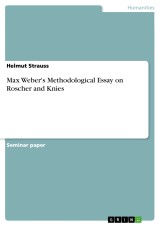Details

Max Weber's Methodological Essay on Roscher and Knies
1. Auflage
|
CHF 15.00 |
|
| Verlag: | Grin Verlag |
| Format: | EPUB, PDF |
| Veröffentl.: | 20.05.2004 |
| ISBN/EAN: | 9783638277389 |
| Sprache: | englisch |
| Anzahl Seiten: | 13 |
Dieses eBook erhalten Sie ohne Kopierschutz.
Beschreibungen
Seminar paper from the year 2004 in the subject Sociology - Methodology and Methods, grade: A (1,0), The New School (Graduate Faculty), language: English, abstract: I. Introduction
In 1902, a new phase in the scientific production of Max Weber began. Still suffering from his breakdown in 1898 which forced him to refrain from any intellectual work for several years, Weber started working on a different field of interest than before his crisis; he focused on methodological issues.
Weber had, already at the age of thirteen, actually written an essay which touched upon fundamental questions of the philosophy of history, like establishing of “laws of history”. The occasion on which Weber started writing his academic methodological works was a request by his colleagues at the University of Heidelberg to contribute an essay for a Festschrift of the university.
“Roscher und Knies und die logischen Probleme der historischen Nationalökonomie” was the first of the methodological essays written by Max Weber from 1902 on.
The value of Max Weber’s methodological essays was often underestimated. In Reinhard Bendix’s “Intellectual Portrait” e.g. they are “intentionally” left out in favor of Weber’s empirical work . Oakes even judges Weber’s metatheoretical project as a failure because of a lack of examination, understanding and evaluation on the part of his successors. In this paper, I am going to focus on the Weber’s essay on “Roscher and Knies” as a primary source, because the conclusions reached by Weber here are premises for his later methodological work. My aim is not to give a comprehensive analysis of this essay, but rather an overview of central points in Weber’s concept.
As secondary literature, I shall use Oakes “Introductory essay” to the “Roscher and Knies” essay, Toby Huff’s study in Weber’s methodology and for the biographical context, parts of Marianne Weber’s biography of her husband.
First of all, I shall look at the Methodenstreit in the German sciences which constituted the intellectual context inspiring and -in a way- provoking Weber. Secondly, I shall examine his critiques both of the ‘naturalist’ and of the ‘intuitionist’ positions and also take Weber’s remarks on ‘irrationality’ into account.
Then, I shall try to reconstruct the main thoughts of Weber’s own concept as it is shown in his rejection of Wundt’s category of ‘creative synthesis’ and in his theory of ‘causal explanation and meaningful interpretation’.
After a short summary of Weber’s ideas, I shall conclude with the attempt to show the importance of Weber’s methodological concept for the theory of history. [...]
In 1902, a new phase in the scientific production of Max Weber began. Still suffering from his breakdown in 1898 which forced him to refrain from any intellectual work for several years, Weber started working on a different field of interest than before his crisis; he focused on methodological issues.
Weber had, already at the age of thirteen, actually written an essay which touched upon fundamental questions of the philosophy of history, like establishing of “laws of history”. The occasion on which Weber started writing his academic methodological works was a request by his colleagues at the University of Heidelberg to contribute an essay for a Festschrift of the university.
“Roscher und Knies und die logischen Probleme der historischen Nationalökonomie” was the first of the methodological essays written by Max Weber from 1902 on.
The value of Max Weber’s methodological essays was often underestimated. In Reinhard Bendix’s “Intellectual Portrait” e.g. they are “intentionally” left out in favor of Weber’s empirical work . Oakes even judges Weber’s metatheoretical project as a failure because of a lack of examination, understanding and evaluation on the part of his successors. In this paper, I am going to focus on the Weber’s essay on “Roscher and Knies” as a primary source, because the conclusions reached by Weber here are premises for his later methodological work. My aim is not to give a comprehensive analysis of this essay, but rather an overview of central points in Weber’s concept.
As secondary literature, I shall use Oakes “Introductory essay” to the “Roscher and Knies” essay, Toby Huff’s study in Weber’s methodology and for the biographical context, parts of Marianne Weber’s biography of her husband.
First of all, I shall look at the Methodenstreit in the German sciences which constituted the intellectual context inspiring and -in a way- provoking Weber. Secondly, I shall examine his critiques both of the ‘naturalist’ and of the ‘intuitionist’ positions and also take Weber’s remarks on ‘irrationality’ into account.
Then, I shall try to reconstruct the main thoughts of Weber’s own concept as it is shown in his rejection of Wundt’s category of ‘creative synthesis’ and in his theory of ‘causal explanation and meaningful interpretation’.
After a short summary of Weber’s ideas, I shall conclude with the attempt to show the importance of Weber’s methodological concept for the theory of history. [...]
Diese Produkte könnten Sie auch interessieren:

Bayesian Evaluation of Informative Hypotheses

von: Herbert Hoijtink, Irene Klugkist, Paul Boelen

CHF 118.00















